“Prava Ludiny” (human rights) monthly bulletin, 2013, #01
Against Television Justice The right to a fair trial
Problems with Translation: On defending the State coffers Let’s see if this one sticks? One month under the new Criminal Procedure Code Freedom of expression
Activists jailed for anti-Yanukovych graffiti Freedom of peaceful assembly
No victims, no video footage – or so the police claim Law enforcement agencies
Increased protests against judges and the law enforcement bodies predicted Victims of political repression
Foul legacy of Stalinism We remember
In Memory: Mykhailo Horyn
Against torture and ill-treatment
Against Television Justice
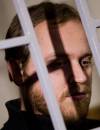
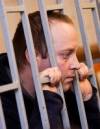
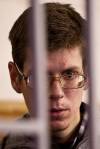
The appeal below has been sent to participants in the EU-Ukraine summit, as well as the Committee for the Prevention of Torture, Amnesty International and many others. We are asking for the Summit participants to raise the issue of three young men in detention since 2010. The case urgently requires attention because the men are widely assumed to be innocent but expected to get hefty prison sentences because of the President’s role in the case.
The appeal below is posted in Ukrainian and English here http://blogs.telekritika.ua/?id=3202& The signatures are given below only in the languages they were sent in - they include two former political prisoners, a number of defence lawyers, journalists, human rights activists, and others. All are concerned about a likely miscarrage of justice and believe that three men’s lives must not be destroyed in this way.
Appeal to the Participants in the EU-Ukraine Summit on 25 February in Brussels
We are writing with respect to the planned EU-Ukraine Summit on 25 February and repeated statements from high-ranking EU representatives that the Summit will be raising the issue of selective justice in Ukraine.
This is indeed a serious problem at present and EU close attention and unwavering stand are vital. .
We would therefore draw your attention to one case which, while not so obviously politically motivated, bears many of the same hallmarks as the prosecutions of Tymoshenko and Lutsenko.
There are grounds for believing that the inalienable right of three young men to a fair trial is being violated as the result of the specific features of the case. The day after a bomb exploded in the Svyato-Pokrovsk Church in Zaporizhya on 28 July 2010, President Yanukovych appeared on television ordering the heads of the law enforcement bodies to catch those responsible effectively within the week. Less than a week later the Interior Minister announced just as publicly that the crime had been solved and the criminals remanded in custody. Two and a half years later the three young men remain in detention, and though there is a widespread belief that they had no connection with the crime, virtually nobody expects an acquittal. The latter would mean that the police had unwarrantedly received awards for their record speed in cracking the crime and would in fact mean that this case which the President had taken under his personal control had not been solved. The President would therefore be annoyed.
Three young men, two former sacristans of the Church and the elder brother of one of them have effectively become hostages of a promise made to the President.
The case has involved very serious irregularities, with one of the latest being the revision of the indictment to remove the part of the impugned crime for which all three defendants have an alibi. .
Two expert assessments from authorized institutes effectively corroborated the allegations of all three defendants, finding that they had been placed under enormous psychological pressure. The judge then ordered a third which obligingly found that there was no psychological pressure. Translations of some of the transcripts from the interrogations can be found here. We believe that these render the opposite view expressed by the last expert disturbingly untenable
Given the very serious concerns over this case, and the destructive effect on Ukrainian society of any trial whose outcome is widely seen as connected with factors unrelated to the guilt or innocence of the defendants, we would respectfully ask you to raise this issue at the coming summit. We would ask you to stress the need for a full investigation into all irregularities in the case and the allegations by all defendants that their confessions, now retracted, were given under both physical and psychological pressure. It would be particularly helpful if you could stress that the three men’s guilt has in no way been established, and that there is no reason to believe that the public would be endangered by choosing a different restraint measure, not associated with detention
Thank you for your attention.
Zynoviy Antonyuk, former political prisoner
Halyna Coynash
Oleh Levytsky, Defence Lawyer
Myroslav Marynovych, former political prisoner, Rector of the Ukrainian Catholic University
Vladimir Stepanov
The full list:
Зиновій Антонюк, колишній політв’язень
Галина Койнаш
Олег Левицький, адвокат
Мирослав Маринович, колишній політв’язень, проректор Українського католицького університету
Владимир Степанов
Олександра Матвійчук, Центр Громадянських Свобод.
Марія Алексеєнко
Ірма Крейн
Леонід Коздоба
Евген Захаров, Харківська правозахисна група
Людмила Клочко, Харківська правозахисна група
Андрій Диденко, Харківська правозахисна група
Олександр Букалов, «Донецький Мемориал»
Володимир Каплун, Харківська правозахисна група
Роман Миколайович Подолян, приватний підприємець
Кшиштоф Следзиньский
Наталья Танатарова
Людмила Вольська
Олег Мартиненко
Алла Тютюнник, письменник, кінодраматург, журналіст
Андрій Книжний, Клуб толерантності, Київ
Володимир Бацунов, , Харківська правозахисна група
Борис Захаров, директор КЦ "Indie"
Марина Захарова, музикант
Наталія Щербата
Олександр Шацький
Володимир Лесик, Голова асоціації захисту прав громадян України
Professor Bill Bowring, Barrister & Director of the LLM/MA in Human Rights
School of Law, Birkbeck, University of London
Наталія Койнаш, психолог
Oliver Sheehan
Ольга Калашник, Центр «Ла Страда-Україна»
Маргарита Валерьевна Чухрий
Анастасія Ольховнікова
Галина Місірук
Наталя Беліцер, Інститут демократії імені Пилипа Орлика
Олена Грушко
Наталя Камишникова, журналіст, Нововолинськ.
Людмила Василевская
Юрій Луканов, журналіст
Ірина Кулик
Людмила Дмитренко
Олександра Марченко
Андрій Сенчук, режисер.
В’ячеслав Бур’ян.
Артем Поляк, програміст, Харків
Микола Кушнір, доцент фізичного факультету Чернівецького національного університету ім. Ю. Федьковича.
Богдан Василенко, газета "Суббота плюс", Запорожье
Михаил Багинский, журналист
Юрий Азаров, адвокат
Наталя Камишникова, журналіст, Нововолинськ.
Руслан Таратула, правник
Владислав Коротаев, адвокат
Олена Шклярук
Світлана Марченко
Владимир Грынык
Борис Потапенко, Ліґа Українців Канади
Томас Мілєновіч
Олексій Теплінський, провідний науковий співробітник,
Інститут математики НАН України
Андрій Кавчук, Юрист
Fabrice Esteve
Володимир Ханас, Адаптаційний чоловічий центр, Тернопіль
Валерій Савенко
Володимир Шевченко, м. Тернопіль
Лариса Вікторівна Пастухова
Наталія Крісман, адвокат м. Львів
Олена Бурлакова
Анатолій Бурлаков, інженер-будівельник, Дніпропетровськ
Інна Улезко, вчитель, Дніпропетровськ
Андрей Петрович Тонне
Ярослав Балан
Сергей Белоусов
Роман Сербін
Ірина Красовська
Ewa Sowa, radca prawny
Larissa Fradkin, Sound Mathematics
Vsevolod Afanasyev, British Antarctic Survey
Мирослав Львович Горбачук, член-кореспондент НАН України, доктор фізико-математичних наук
Валентина Іванівна Горбачук, доктор фізико-математичних наук
Bohdan Solowij, Adelaide, Australia
The right to a fair trial
Problems with Translation: On defending the State coffers
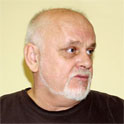
Oleksandr Bukalov
The Donetsk human rights organization Donetsk Memorial has long followed the hard fate of Ukraine’s State Budget. So as to not remain on the sideline, the organization decided to take a part, so to speak, in its retention.
What is in question is compensation of costs incurred through European Court of Human Rights judges. Recently in just one day through such judgements the European judges cleaned the State coffers of more than 11 million UAH. Yet any person in their right mind understands that it was effectively not judges of the European Court who cleaned out the coffers, but our officials, including judges who infringed the law in passing judgements.
So how did Donetsk Memorial protect the State budget? The organization wrote a letter to the Justice Ministry on 4 June, with regard to two European Court of Human Rights judgements - the. cases of Tsygoniy v. Ukraine and Veniosov v. Ukraine. In the case of Tsygoniy v. Ukraine, because a Ukrainian local court in 2004 issued an order which the European Court found unlawful to remand the applicant in custody, Ukraine paid the applicant 10 thousand EUR. In the case of Venisov v. Ukraine, it paid the applicant 6 thousand EUR because the Central District Court in Simferopol in 2005 remanded him in custody.
We asked “Does the Justice Ministry as the body with the authority plan to take measures for compensation by judges whose unlawful actions cost the State 16 thousand EUR of these costs? If NOT, then we would ask you to inform us why the Justice Ministry does not consider it necessary to seek compensation from specific individuals who led to these costs”.
The Justice Ministry did not reply.
As it failed to reply to a repeat information request on 2 August 2012 (thanks to Minister Lavrynovych that he made it clear how his words about the lawfulness of the government’s actions match up to his actions). It was only after the third letter in September sent not only to the Justice Minister, but to the Prime Minister and Prosecutor General, that a response was finally received from the Justice Ministry containing a detailed explanation of procedure in the case of damage caused the public coffers by European Court of Human Rights judgements. However there wasn’t a word about the Crimean judges and the damage which they caused the public coffers (incidentally can one somehow find out their names?)
This battle to retrieve the expense to the State budget, which the Minister is for some reason stubbornly resisting, , inspired us to new creative steps. We sent letters, now also to the President and again to the Prosecutor General’s Office, and to the Prime Minister about the inexplicable (in fact explicable) efforts by the Justice Ministry to avoid giving substantive answers to our questions.
That worked.
The letter signed by the Deputy Justice Minister A.Y. Sedov can be considered a response to the substance of our questions (see below). It contains several quite incredible and curious points. The first is in the very first sentence.
“In accordance with the letters of the Secretariat of the Cabinet of Ministers from 15.12.2012 No. 48761/1/1-12 and Prosecutor General’s Office from 17.12.2012 No. 19-4, your letter from 01.12.2012 No. 279 has been considered”.
In other words our letter from 1.12.2012 received consideration in the Justice Ministry not because we had persistently written four times to the Ministry with one and the same question and the Justice Ministry had to provide an answer according to the law but in violation of the law did not. The Justice Ministry answers because it has received letters from the Secretariat of the Cabinet of Ministers and from the Prosecutor General’s Office (creativity worked).
The letter names two documents which impose the duty (not the right!) on the Justice Ministry to lodge an application with the court (and not the Prosecutor General’s Office, see below)
The grounds for “the Justice Ministry lodging an application for compensation of losses caused the State of Ukraine as the result of unlawful rulings issued by judges, are the establishment of elements of a crime in the actions of the person through a guilty verdict by a court (to which the Justice Ministry itself must turn – see below)”.
And here the long-awaited words about the specific cases asked about.
“At the same time we would inform you that at present work is underway on preparing authentic translations of the European Court of Human Rights judgements in the cases of Tsygoniy v. Ukraine and Veniosov v. Ukraine”.
Only after this will the Justice Ministry … turn to the Prosecutor General’s office asking for a check to be carried out, for the people responsible for causing losses to the State Budget of Ukraine in connection with implementing the European Court of Human Rights judgements Tsygoniy v. Ukraine and Veniosov v. Ukraine to be identified and held accountable”.
So when might that be? By all means, there’s an answer to that too.
“After the translations of these judgements have been made…”
What is important in the Justice Ministry letter is mention of yet another normative document – the Rules of Procedure for organizing work on compensation of costs caused the State Budge in connection with implementing European Court of Human Rights judgements. It would be interesting to see it.
There is also something of a surprise in the letter though in fact it’s not a huge surprise. The Justice Ministry for some reason thinks that to establish and hold accountable people guilty of inflicting losses on the State Budget in connection with implementing European Court of Human Rights judgements, it should turn not to the court, but to the Prosecutor General’s Office. Is it really not possible when turning to the court to assess whether there were infringements? How cowered must our courts be that only “a permit” from the Prosecutor’s Office will open the door to the exercise of justice? Yet according to such logic it follows that if, for example, the Prosecutor General’s Office is mistaken and (let’s assume) proposes to find the judges guilty – the court will rectify this mistake and the judges will be found clean before the public and the justice system. But if the Prosecutor’s Office is mistaken in another direction and – in the event of the judges’ guilty – finds them innocent, the Justice Ministry will not apply to the court and the court will be deprived the chance of rectifying such a “mistake” by the Prosecutor’s Office. And then the hole in the budget will not be reduced. ..
I’m not even asking about the time which the Justice Ministry could take on its “authentic translation”. The judgements in the above-mentioned cases were on 24 November 2011 and 15 December 2011, and as of 4 January 2013 - well over a year! – there are still no translations. And there it may not be far off the time bar for bringing judges to answer… And there are still no threats to the Crimean judges.
And there may not be any such threat for a long time. I am therefore calling on anyone who shares concern for the State budget: don’t be indifferent, write to the Justice Ministry about other European Court of Human Rights judgements, ask them when those guilty of losses to the State coffers will be held answerable
Oleksandr Bukalov
Donetsk Memorial
The letter from the Justice Ministry to O. Bukalov
In accordance with the letters of the Secretariat of the Cabinet of Ministers from 15.12.2012 No. 48761/1/1-12 and Prosecutor General’s Office from 17.12.2012 No. 19-4, your letter from 01.12.2012 No. 279 has been considered, and we inform of the following.
Pursuant to Article 9 § 5 of the Law on Implementing judgements and applying case law of the European Court of Human Rights from 23.02.2006 No. 4777-IY; Cabinet of Ministers Resolution “On measures enforcing the Law on Implementing judgements and applying case law of the European Court of Human Rights from 31.05.2006 No. 784, the Justice Ministry is obliged to lodge an application with the court for compensation of costs inflicted on the State Budget of Ukraine as the result of payment of compensation in accordance with European Court of Human Rights judgements.
Article 1191 § 3 of the Civil Code establishes that the State, having compensated damages caused by an official of a detective inquiry [diznannya], criminal investigation body, Prosecutor’s Office or court, has the right to make its own claim against that official only where elements of a crime have been established in the actions of the person through a guilty verdict by a court which has come into force.
Therefore the grounds for the Justice Ministry lodging an application for compensation of losses caused the State of Ukraine as the result of unlawful rulings issued by judges, are the establishment of elements of a crime in the actions of those judges.
At the same time we would inform you that at present work is underway on preparing authentic translations of the European Court of Human Rights judgements in the cases of Tsyhoniy v. Ukraine and Veniosov v. Ukraine
After the translations of these judgements have been made, the Justice Ministry in accordance with the Rules of Procedure for Organizing work on compensation of costs caused the State Budge in connection with implementing European Court of Human Rights judgements, passed by Justice Ministry Order No. 3280/5 from 08.11.2011 will
turn to the Prosecutor General’s office asking for a check to be carried out, for the people responsible for causing losses to the State Budget of Ukraine in connection with implementing the European Court of Human Rights judgements Tsyhoniy v. Ukraine and Veniosov v. Ukraine to be identified and held accountable.
If the court issues a guilty verdict finding elements of a crime in the actions of the relevant officials, the Ministry of Justice in accordance with legally established procedure will take measures on compensating the damages caused the State Budget of Ukraine by submitting a law suit against the culprits.
Deputy Justice Minister A.Y. Sedov
Let’s see if this one sticks?

Victor Pshonka, Prosecutor General
Many Ukrainian politicians have been suspected of using means far less fair than foul to amass power and wealth, and rumours that such methods have included hiring killers abound. That said, there seems little if any likelihood that the West will find the latest accusations made against former Prime Minister and opposition leader Yulia Tymoshenko any less politically motivated than her 7-year sentence over the 2009 gas accords with Russia and new trial on tax evasion charges.
Ukraine’s Prosecutor General Viktor Pshonka on Friday accused Tymoshenko of ordering the killing 16 years ago of Yevhen Shcherban. That’s four years earlier than the murder of journalist Georgy Gongadze, where the finger was pointed, with apparently serious grounds, in one direction from the outset and all to no avail. Those who ordered the journalist’s murder remain at liberty – unlike Yulia Tymoshenko.
Pshonka now claims, he has evidence able to convict Tymoshenko of paying 2.8 million USD to get Shcherban murdered.
Western observers may well recall the evidence on a website created after Yevhenia Tymoshenko’s email accounts were hacked. This included an astronomical “bill” from the Berlin Charite Clinic treating Yulia Tymoshenko which a Die Zeit journalist has said would be identified as a fake by any person who has been to the doctor in Germany. Pshonka does not specify what the evidence is, or why it has apparently only come to light in the last year. More than 15 years was surely long enough to destroy incriminating evidence not discovered at the time. Western media reports mention that the slain man’s son, Ruslan Shcherban, came forward last year with evidence implicating Tymoshenko. What the evidence is, or in fact could be, has never been revealed, nor did Reuters mention other interesting details. Ruslan Shcherban, now a Party of the Regions Deputy of the Donetsk Regional Council gave a press conference in April 2012 shortly after Deputy Prosecutor General Kuzmin publically stated that Tymoshenko was involved in the murder. The two events were supposedly unrelated. Shcherban Junior claims that he was frightened to speak out earlier but now wants to know who committed the crime. He has also not specified what his evidence is, but he felt strongly enough to write to the US Ambassador asking the US to not block the Ukrainian law enforcement bodies. Over recent months, Kuzmin has effectively suggested that the American authorities are working against the Ukrainian investigators, and that is the nicest way of putting his rather disturbing insinuations.
No charges have yet been laid, but if they were to be, they carry a life sentence. It was not only the charge against Yulia Tymoshenko that aroused concern in 2011, but the very many irregularities in the circumstances behind her detention and the trial itself. In both the first cases brought before the European Court of Human Rights by Tymoshenko’s lawyers, and those representing imprisoned Interior Minister Yury Lutsenko, the Court has seen the need to hold public hearings. In Lutsenko’s case, serious violations were found. The judgment in Tymoshenko’s case is expected in the near future. If those pulling the Prosecutor’s strings seriously believe that such statements will discredit the former Prime Minister and therefore cushion the likely blows from Strasbourg as well as harsh words at the EU-Ukraine Summit on 25 February, they are seriously mistaken. Not, of course, for the first time.
Another audience
Within days of the international condemnation of Tymoshenko’s 7-year sentence in 2011, the State-owned UTV-1 was full of one-sided reports about the former Prime Minister’s alleged economic crimes and their cost to the Ukrainian public. These turned into actual charges however hearings in the case have been consistently deferred in connection with Ms Tymoshenko’s health.
The same form of coverage was given to Pshonka’s accusations, as well as to the general bouquet of different charges at the beginning of the Friday evening news on UTV-1. The headline calls Tymoshenko and Lazarenko the “main suspects” in the murder of Shcherban, however Pshonka himself – and his is the only voice heard – clearly has no time for the presumption of innocence.
“First, Lazarenko personally paid the gang 500 thousand dollars after the murder, 500 thousand dollars. And then 2 million 300 thousand dollars was transferred. And all the transfer was organized by Tymoshenko”.
Forgive the tasteless comparison, but the prices bandied about for hiring a killer in Russia at that time were on a different - vastly smaller - scale altogether .
The figures, however, would certainly blow the minds of TV viewers. No attempt, incidentally, was made to inform the large number of viewers who will have forgotten or never known that the murder in question took place in 1996.
Lest those viewers not understand how the figures touch their own pockets, the next news item informs that “the Prosecutor General’s Office has merged the Shcherban Case with another - that regarding the United Energy Systems of Ukraine Corporation case”. In the latter Tymoshenko stands charged with concealing foreign currency profit and tax evasion. That merging them is pure nonsense from a legal point of view is a mere detail – for the task in hand it makes perfect sense. We learn that Ukraine has repaid 15 million UAH, and that the Russian Defence Ministry is demanding the return of over 400 million dollars owed them by the United Energy Systems of Ukraine from the days when it was under Yulia Tymoshenko’s control.
Murder, embezzlement, tax evasion, what next?!
Perhaps those in power really have advisers so extraordinarily incompetent that they believe such charges will wash with the West. More likely they’re aimed at the audience at home. Not that they’ll wash there either, but with so much mud hurled around, some will doubtless stick.
One month under the new Criminal Procedure Code
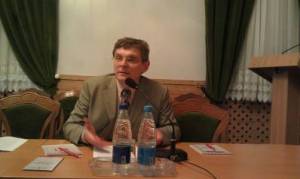
Arkady Bushchenko, Defence lawyer and Executive Director of the Ukrainian Helsinki Human Rights Union, was asked in a recent interview to assess one month after the new Criminal Procedure Code came into force what has changed as predicted, and what not.
Arkady Bushchenko points out that it’s hard to judge since a large number of cases are still being examined under the old Criminal Procedure Code [CPC],
He says however that procedural agreements on admitting guilty are now being actively used and some lawyers have already had experience of using this norm. “My colleague, for example, reached agreement with the Prosecutor’s Office and as a result the person got off with a fine of 850 UAH (less than 100 EUR).” He says that there were grounds for fighting for a full acquittal but the client didn’t want to expend the energy needed, and the time.
He says that there recently reports that the number of rulings to remand people in custody as a preventive measure had fallen four times. Since the figures were given by officials with authority, one would like to believe that they’re correct.
There is a problem with the Transitional Provisions according to which for a certain period both new and old CPC norms are in force. This is a legal nonsense which you won’t find anywhere in the world. He expresses the hope that the new parliament will regulate the situation.
“Of course some fears remain since we have new procedure, but old players. Therefore without reform of the Prosecutor’s Office; launch of a system of legal aid; without comprehensive reform of the courts it could all end badly.
There will be resistance, he adds, and for 6-9 months there will be ferment as with any system under reform. There will also be the temptation to return to old ways.
Asked for his comment on assertions that the new CPC doesn’t suit Ukrainians’ mentality, Bushchenko noted that in some things the Code has been adapted. He points out that norms in the USA or UK are much broader, without exhaustive detail, this being left to the judge. In Ukraine many colleagues pointed out quite rightly that Ukrainian judges won’t work like that, they need detailed instructions. This, he says, was taken into account, and the Code is extremely detailed. Many norms, he explains, are set out in one sentence in normal civilized countries, but require a page and a half of detail in Ukraine to make sure that the police, judges etc treat it within the correct framework. “This excessive detail is a concession to our mentality, general legal ignorance, frequent corruption and lack of conscience”.
Legal aid
A legal aid system is beginning to function whose lawyers will provide defence in 85-90% of criminal cases. Bushchenko stresses that the system includes collection and exchange of information. He is in the working group responsible for this and can see that there is considerable progress. The system began at the beginning of this year. This, he says, has been one of the few examples of what really can be achieved in Ukraine. He believes these lawyers, working together within this system will really be able to have impact on practice. “This is effectively a counter to the Prosecutor’s Office which is a powerful system with its own clan mentality, convictions and so forth.”
With respect to concern about the norm allowing defendants to enter into agreements with the Prosecution leading to people simply not asserting their innocence, Arkady Bushchenko acknowledges the substance of such arguments which he says have been presented for 100 years. If countries had unlimited resources, he says, the argument would be valid, but even the USA does not have enough, and they understand that swift pre-trial regulation of conflict, for example, between an offender and the State is needed.
There are, he explains, a number of guarantees against confessions of guilt being beaten out of people which did not exist before. He points out also that such agreements were possible before, as well as other norms, but were not applied often enough.
With respect to the agreement where a person admits guilt, a defence lawyer must be present. The person must also have his rights explained to him as well as the consequences of the agreement. He must also be told clearly that once the court has approved the agreement, he loses any right to call witnesses, appeal against a sentence on the basis of facts incorrectly presented. There are no greater guarantees anywhere in the world, he says.
Arkady Bushchenko fears that attempts to introduce amendments which will change the ideology behind the new CPC will prove successful. The Prosecutor’s Office lobby, for example, is very strong. They find it convenient to stay with the old CPC.
Much abridged from the interview (where many of the questions pertain to misunderstandings about the CPC; claims, which Bushchenko demolishes, that removal of the right to appeal against initiation of a criminal investigation somehow encroaches on people’s rights, and others. )
Freedom of expression
Activists jailed for anti-Yanukovych graffiti

The “Chorny Komitet” or “Black Committee” website informs that a court in the city of Sumy sentenced four of its activists to varying terms of imprisonment. They were charged, it asserts, with “painting posters showing Yanukovych with a gunshot wound in the head; extremist captions on walls, and an arson attempt on a hostel.
The Committee asserts that one of the defendants, Ihor Hannenko was accused of a protest action which he had no relation to, and that a confession was beaten out of him.
It says that the same torture methods were used against two others, Mykhailo Pysartsov and Dmytro Danilov who have been held in a SIZO [pre-trial detention centre] for over a year.
The Committee says that Volodymyr Nykonenko was found guilty of painting posters with the image of the President which was deemed extremist.
Chorny Komitet asserts that Pysartsov and Danilov got two year sentences; Hannenko – 1.8; and Nykonenko 1 year.
The criminal investigation was reported by the Lviv police in June 2011 specifically over the posters with Yanukovych’s head.
This is not the only case involving criminal investigations over anti-Yanukovych graffiti. In late February 2012, extraordinarily disproportionate measures were taken against two young students in Kherson. They were detained on 29 February for pasting up leaflets with criminal investigations initially initiated. The criminal charges were eventually dropped, and the two were fined for “spreading untruthful rumours which could arouse panic among the population or disrupt public order”, an administrative offence (Article 173-1 of the Code of Administrative Offences).
Following the initial police actions against the two Kherson students, a group of young people, having formed the System for Collective Safety of Young People MAMA, held protest actions in support of them. Three young men were detained in Donetsk.
The “offending” posters had a photo of Viktor Yanukovych and a slight, but crucial difference in the words of a famous Soviet song. The relevant line in the original says “I don’t know another country [other than the USSR – translator] where people breathe so freely”. The changed version reads: “I don’t know another country whose President is a former prisoner”.
It should be noted that Viktor Yanukovych did indeed serve two prison terms on criminal charges.
Freedom of peaceful assembly
No victims, no video footage – or so the police claim
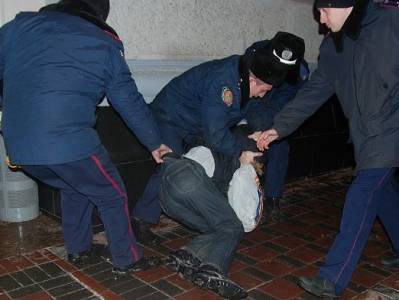
Over recent months there have been protests throughout Ukraine in support of Dmytro and Serhiy Pavlichenko, a father and son convicted of the killing in 2011 of a Kyiv judge, Serhiy Zubkov. The prosecution claimed that this was because the judge had ordered their eviction over a property dispute. Those who believe the men to have been wrongly prosecuted are calling for a new investigation.
The Kharkiv Internet site MediaPort reports that between 400 and a thousand football fans and members of national organizations took part in a protest march from the football stadium to the Regional Police Department in support of the convicted Pavlichenkos. They called for the men’s release and, MediaPort says, “provoked the police, shouting abuse at the officers, throwing snowballs and firecrackers at them”.
The police did not respond until the protesters reached the Regional Police Department and announced the end of the march. Then the police went on the offensive. During that evening 22 people were detained. Some were beaten up by the police. A MediaPort film crew took pictures of a pool of blood in the foyer of the regional department building. Journalists also saw one of the fans being kicked by police officers.
On 21 December MediaPort sent a formal information request to the Regional Police Department They asked to see the CCTV footage from the cameras at the entrance and in the foyer, and also asked about the results of an official check into allegations that the police had beaten detainees. They asked what had happened to the detainees who did not appear in court the next day.
The response claims that the footage on 13 December “for reasons of a technical nature” was automatically deleted.
The journalists’ question regarding whether such footage should be held for a certain amount of time received no response.
As far as the official check was concerned, the police response was categorical. Nobody had complained of any police brutality; no official check had been carried out; and no police officers had been suspended.
No official statements – no checks. This is despite the fact that there were numerous accounts in the media alleging that the police beat detainees.
MediaPort turned to the Head of the Kharkiv Human Rights Group, Yevhen Zakharov with the question, should the police investigate allegations reported in the media. He answered that yes, both the police and the Prosecutor’s Office are obliged by law to do so. That, at least, is the theory. In practice, he says, they do so only if there’s an order from above.
The Kharkiv Prosecutor’s Office told MediaPort that the relevant Prosecutor’s Office had carried out a check into one report. They promised to provide the details later. They have also been promised an answer to questions about a check by the Kharkiv Regional Prosecutor’s Office next week.
Of the 22 detained, 16 of them appeared in court on 14 December, receiving warnings; fines; or up to 15 days imprisonment. Five appeared in court later: one was jailed; two fined (small amounts) and two got off with warnings. The case regarding one person has still not been examined.
Law enforcement agencies
Increased protests against judges and the law enforcement bodies predicted
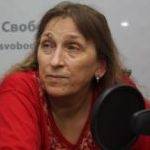
Iryna Bekeshkina, Director of the Democratic Initiatives Foundation, believes that Ukrainians see the judicial and law enforcement bodies as defending the authorities against them. Protests against judges and the police are therefore set to rise steadily.
“People don’t trust the judicial branch of power. They don’t trust our law enforcement bodies at all. A fairly large percentage believe that “lynch courts” are the only way of redressing injustice. And they have many examples to show. As we remember, the Makar case (where a young woman was brutally raped, and then set alight – translator) erupted when the culprits were released. People ready everyday, at least in the Internet of similar cases, and that spreads quite quickly. Sometimes they also see on television that the law doesn’t apply to everybody. The view is therefore widespread that you need to take the law into your own hands”.
Ms Bekeshkina believes that the entire country could probably only be roused by the murder of some popular political leader.
“Otherwise, there’ll be local reactions in the regions where the events take place. However these outbursts will be constant, and this idea will spread”. She notes that the brutal murder of a Kharkiv judge (together with his wife, son and son’s girlfriend – translator) did not elicit any particular condemnation or pity from the public. She says that some even wrote that it was good that he’d been killed, that he’d deserved it.
“Protests are increasing against judges. Public opinion is beginning to view the court and law enforcement systems – police, judges, prosecutors, not as a separate branch of power which defends the justice system, but as people who protect the authorities from citizens.”
At present protests are taking place throughout the country in support of the Pavlychenkos – a father and son convicted of murdering Kyiv judge Zubkov. Marches have taken place in Kyiv, Kharkiv, Cherkasy, Dnipropetrovsk, Chernihiv, Zaporizhya, Sumy, Ternopol, Lviv and other cities.
At the beginning of April 2012 the Democratic Initiatives Foundation and the Razumkov Centre carried out a survey which found that the public are negative in their assessment of the law enforcement system.
Positive Negative
The police 26% 64%
The Prosecutor’s office 23% 64%
The courts 20% 69%
35% said that “lynch courts” were unacceptable in any circumstances; 35% considered them generally unacceptable, but in certain cases justified. 19% were convinced that in our conditions lynch law was the only way of getting justice done.
Victims of political repression
Foul legacy of Stalinism
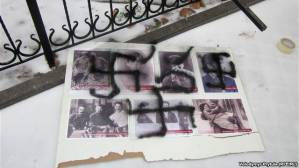
Protesters daubed an exhibition item with swastikas (photo from the Radio Svoboda Ukrainian Service)
The Congress of National Communities of Ukraine has issued a statement regarding the actions by Stalinists on 21 December. At the same time, it is reported that the Crimean Tatars involved in obstructing them may be charged with hooliganism.
The Congress states:
On 21 December 2012 a regional branch of the Russian organization “Sut vremeni – Krym” set up a street exhibition to mark the birthday of Stalin – a criminal whose activities in Ukraine have been condemned by the Law on Holodomor 1932-1933 in Ukraine from 28 November 2006 and by the related court ruling, and in European by the Parliamentary Assembly of the OSCE “Divided Europe Reunited: Promoting Human Rights and Civil Liberties in the OSCE Region in the 21st Century” from 3 July 2009.
An attempt by provocateurs, inspired by the Russian neo-Stalinist Sergei Kurginyan, to present this criminal as the most significant State leader in the history of Russian civilization is an insult to the member of the peoples who endured tragedies unprecedented in their scale and consequences – the Holocaust, Holodomor, Deportation on the basis of nationality; repression – of Ukrainians, Jews, Crimean Tatars, Armenians; Poles; Germans; Greeks and members of many other ethnic groups in the country.
It is not without ill intent that the provocation was organized at a time when Ukraine is taking on the presidency of the Organization for Security and Cooperation in Europe, the body which condemned the Nazi and Stalinist totalitarian regimes responsible for a huge number of war crimes and crimes against humanity which entailed genocide and violation of human rights and freedoms.
We fully share the anger of the Crimean Tatars who destroyed the exhibition glorifying a dictator responsible for the genocide of the Crimean Tatar people which stripped them of their Homeland and caused an incalculable number of victims during the years of the Deportation.
We call on Ukrainians of different nationalities to support the legitimate outrage of the Crimean Tatars and speak out against attempts to use a criminal to insult the member of whole ethnic groups and provocation against Ukraine. We must finally free ourselves from the foul legacy of Stalinism. We are convinced that such attempts should be severely punished at court level and condemned by the Verkhovna Rada and President of Ukraine.
Meanwhile the Crimean Prosecutor’s Office has reported that it is carrying out a pre-trial investigation into the actions of the Crimean Tatars under the article of the Criminal Code « hooliganism ».
As reported, on 21 December a group of Crimean Tatars led by members of the Mejlis of the Crimean Tatar People destroyed the exhibition to the Soviet dictator marking the 133rd anniversary of his birth. The exhibition had been brought from Russia and mounted by people calling themselves members of the Russian civic organization “Sut Vremeni” [Essence of the Time] and its Crimean branch.
It showed photos of the dictator himself, as well as of foreign political figures with quotes praising Stalin and official pictures of Stalin’s Terror. The organizers also handed out leaflets calling on people “to get a grip of history and pay due to such a major historical figure as Stalin.”
After the organizers refused to dismantle the exhibition, a group of Crimean Tatars led by two members of the Mejlis of the Crimean Tatar People hurled down the stands with the quotations and images of Stalin, with some of those present also taking part in the dismantling. Somebody used a paint canister to draw something similar to a swastika. They said that for them Hitler and Stalin were the same.
Radio Svoboda reported at the time that the police had been present but had not intervened and that the local authorities had refused to comment as to why they had not attempted to ban an exhibition which is profoundly offensive to many and incites inter-ethnic conflict.
We remember
In Memory: Mykhailo Horyn
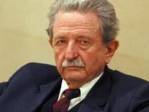
Mykhailo Horyn, former dissident and political prisoner, human rights defender and civic and political figures passed away in the early hours of Sunday morning. He was eighty two.
Mykhailo Horyn, together with his brother Bohdan, was one of the shistdesyatnyky, the young intellectuals in the 1960s who played a vital role in a cultural and political revival which opposed the political lies and repression of the Soviet system. Both brothers played active roles in the national democratic movement from the 1960s to 1990s.
Mykhailo Horyn was a key figure in coordinating samizdat literature and was twice a political prisoner: he was arrested for the first time in 1965 for what the Soviets called “anti-Soviet agitation and propaganda” and sentenced to 6 years labour camp. The second sentence was 10 years.
Mykhailo Horyn came from a family with strong nationalist views and was himself active in preparing and distributing leaflets as a young man. He graduated from the Logic and Psychology Faculty of Lviv University and worked as a lecturer, while also producing methodological works for teachers.
He became active in the dissident movement in the 1960s and began writing more and more openly anti-Soviet articles (circulated, obviously, via samizdat).
He was arrested on 26 August 1965 and charged under Article 62 § 1 (“Anti-Soviet agitation and propaganda”) of the Criminal Code. On 18 April 1966 he was tried together with his brother, Bohdan, Ivan Hel and Myroslava Zvarychevska behind closed doors and sentenced to 6 years harsh regime labour camp. Horyn denied any guilt, and his final words at the trial were later circulated in samizdat.
He remained in active opposition in the Mordovan labour camps which resulted in him being sentenced to 3 years in the Vladimir Prison.
He was released in August 1971 but not allowed registration in Lviv where his family lived and was forced to work as a train driver in the Rivne oblast.
He became involved in the Ukrainian Helsinki Group, founded in 1976. His role was at first secondary, however after the arrests of the UHG’s founders he took on the publishing of their bulletin.
He was arrested for a second time in December 1981, this time receiving a 10 year harsher regime labour camp sentence, to be followed by 5 years exile. He arrived at the notorious Perm 36 camp (the Urals) in November 1962. He was pardoned under the Gorbachev amnesty in July 1987.
Mykhailo Horyn remained active in political life and in the human rights movement throughout the rest of his life.
Вічна памˈять Eternal Memory





